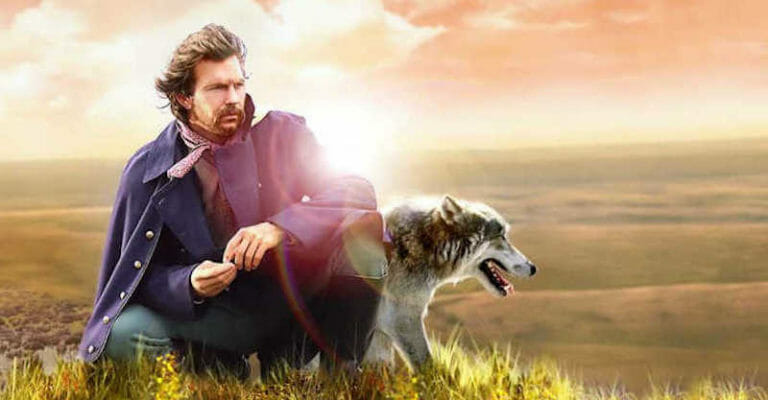By Ken Miyamoto · January 30, 2020

What are some inspiring writing lessons that writers can learn from the story of Kevin Costner and the late Dances with Wolves author and screenwriter Michael Blake?
Welcome to the inaugural post of our new ongoing series, Inspiring Writing Lessons from the Greats, where we feature inspiring stories from some of the greatest writers and filmmakers of our time and apply the lessons that can be learned from them to your screenwriting journey.
Here we feature the story of a struggling screenwriter named Michael Blake, his rocky friendship with up-and-coming star Kevin Costner, and the story of how the Oscar-winning Dances with Wolves came to be…
Kevin Costner and screenwriter Michael Blake met in 1981. Blake had moved to Los Angeles in the late 1970s. While he had some screenwriting deals, none of his work was produced until 1983’s Stacy’s Knights, which Kevin Costner starred in.

Their friendship took a turn for the worse as Costner’s star began to rise. Costner, trying to help his screenwriter friend, set up multiple meetings for Blake with many of Hollywood’s elite. Costner was leveraging his own industry relationships trying to help his friend.
Blake was clearly not seeing the success he had hoped for in his screenwriting career.
As Costner began to hear back from his Hollywood peers after their meetings with Blake, the feedback was fairly negative.
“I sent him on a lot of jobs and every report that came back was that he pissed everybody off,” Costner told The Graham Norton Show.
Costner went on to explain that Blake was frustrated with Hollywood and even told Costner that he hated all of the Hollywood people. Costner didn’t take that well because those Hollywood people had become his friends.
There was a physical confrontation.
“He crossed the line with a friend of mine and I don’t know what happened, but I had him up against the wall. And I said, ‘Look, would you just quit putting everyone else down. Quit writing things that are a hundred and twenty pages.’ Which in our vernacular is a script. I said, ‘If you really want to write, write something that’s eighty-eight pages long or eight hundred and eighty-eight.’ And I realized I had my hands on him and I set him down and thought that we had probably lost our friendship.”
While the friendship was bruised, it was still strong enough to last.
Blake asked Costner if he could stay with him and his family. Costner said yes, once again trying to help his struggling friend. Blake felt that he needed to be able to afford to focus solely on the writing — which meant that he couldn’t afford to pay rent.
So while he lived in Costner’s house for nearly two months, he was writing and writing. He would even read to Costner’s daughter at night. Costner’s wife at the time was done with having a house guest. Costner agreed and regretfully told his friend that he had to go.
Blake left his writing behind at Costner’s house and moved to Arizona. He was working in a Chinese restaurant washing dishes and was, at times, homeless. Costner would send him things to help him, but Blake always asked if he had read what he left behind.
Finally, fed up, Costner read Blake’s work. It was a screenplay for Dances with Wolves.
“I was never so proud of somebody,” Costner remembered.
However, it wasn’t smooth sailing just yet. At the time, Westerns were considered box-office poison.
Costner and eventual Dances with Wolves producer Jim Wilson agreed that despite its worth, no studio would produce it. They recommended that Blake write it as a novel and try to get it published — and then work to use a reader base to entice studios to adapt it for the screen.
Blake did just that. It was first published as a paperback and sold primarily in airports. It soon became a bestseller, allowing Kevin Costner himself the chance to obtain the rights, knowing that the film adaptation would get the necessary studio distribution.
The rest is Oscar-winning history. Both Michael Blake and Kevin Costner won Oscars for Blake’s screenplay and Costner’s directing and producing.

First off, perseverance is everything. Blake had been in Hollywood for years and wasn’t seeing any type of great success. It got to the point where he had to stay in his friends’ houses, crashing on couches.
Hollywood wasn’t interested in his work. Despite the success of having a screenplay produced, it still wasn’t enough. Most screenwriters believe that once their script is produced on a professional level, the work will come pouring in. It doesn’t always happen that way. And it certainly didn’t for Blake.
This forced him to have a bad attitude towards Hollywood, blaming Hollywood for his problems. Costner points out that Hollywood is a very easy target.
Costner confronted his friend and said that he needed to stop blaming everyone around him and to just try to do better and different work.
Without that reality check, Blake likely wouldn’t have written Dances with Wolves.
While you do have to persevere, you can never push the blame of your failures onto Hollywood. It’s an obvious target. Instead, you just have to keep writing and stay positive.
And finally, you need to cherish the relationships around you. The peers that are trying to break through, just as you are, may be the ones that are eventually in a position to help you succeed later on in your journey.
For all the latest from The Script Lab, be sure to follow us on Twitter, Facebook, and Instagram.
And become a member of TSL 360 to enjoy the LARGEST screenwriting education content library, featuring masterclasses, deep-dive interviews, and lectures from Academy Award-winning screenwriters, TV show-runners, producers, literary managers, agents, studio executives, and leading educators – all in one place.